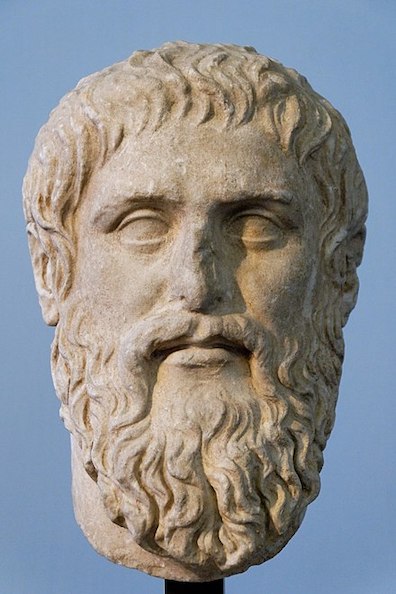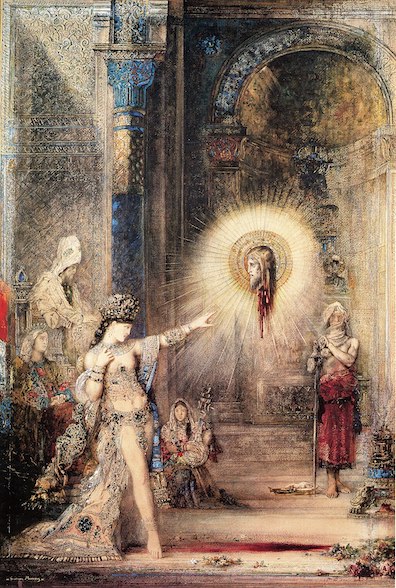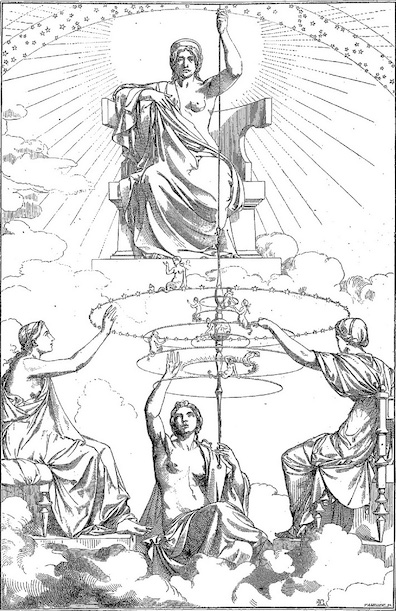"Plato's world of ideas" is, of course, the realm of
incorporeal constitutive principles that Plato thought to be
more real than the things of sensory experience. He never
describes them as existing in a "world" distinct from this
world, but passages in his works can be read as suggesting
something like that. The Phaedrus speaks of the soul
taking flights to "that place beyond the heavens"––topos
hyperuranios––where "true being dwells," including
"justice, its very self, and likewise temperance, and
knowledge, not the knowledge that is neighbor to becoming and
varies with the various objects to which we commonly ascribe
being, but the veritable knowledge of being that veritably is"
(247c-e, trans. R. Hackforth). The allegory of the cave in the
Republic creates a sense of two worlds by imagining
human beings who are slaves to sensory impressions as
prisoners chained in darkness and watching blurry figures
dance across a wall. To be truly sapient and behold things as
they actually are, the prisoner must free himself and exit the
cave. But this story is a series of metaphors, not a
cosmological description.
Considerably looser echoes of Platonism can be heard in a
favorite phrase of Russell's, "formless spiritual essences."
Gifford quotes a passage from the artist's essay Religion
and Love (1904): "Spirituality is the power of
apprehending formless spiritual essences, of seeing the
eternal in the transitory, and in the things which are seen
the unseen things of which they are the shadow." This sounds
as much Theosophical as Platonic, and there is great irony in
calling the Ideas "formless," because eidos, a term
that Plato uses synonymously and interchangeably with idea,
means "visible form." (The root eido means "to look,"
and the English word "eidetic" refers to mental images that
are so vividly detailed that they seem actually visible.) Eidos
is form, shape, figure––literally, the look of something––and
Plato uses it in much the same way that Aristotle uses a
closely related word for form, morphe. Calling the
Platonic Ideas formless is absurd, then––equivalent to saying
"Forms without form." (Only in the last hundred years have
English translators begun to replace Idea with Form, so
whether Joyce was aware of this irony is open to question.)
In rejecting Russell's freefloating spirituality Stephen is
not exactly disagreeing with Plato. Several paragraphs later
in Scylla, however, the discussion comes closer to
something that the philosopher actually wrote. John Eglinton
listens to Stephen and exclaims, "Upon my word it makes my
blood boil to hear anyone compare Aristotle with Plato."
Stephen replies, "Which of the two...would have
banished me from his commonwealth?" It was Plato who did
this in book 10 of the Republic, arguing that
representational arts like painting and poetry should be
banned in the ideal society because they mistake sensory
reality for truth and excite passions that should be
restrained. Aristotle answered these charges in the Poetics,
arguing that literary fictions represent particular events in
such a way that universal truths can be seen in them, and
arouses passions in such a way as to effect emotional
catharsis.
This debate about the value of art is never discussed in Ulysses,
but it is relevant to Stephen's talk. His deep dive into
Shakespeare's home life expresses a belief that real events
are essential to artistic projects and can beget universal
insights: "He goes back, weary of the
creation he has piled up to hide him from himself, an old dog
licking an old sore. But, because loss is his gain, he passes
on towards eternity in undiminished personality, untaught
by the wisdom he has written or by the laws he has revealed."
Shakespeare's sexual life may have been as messy and uncertain
as any other mortal's, but by writing about it so brilliantly
he revealed "laws" of human psychology. In contrast, Russell
opines that lived experience, with all its richness of
sensation and feeling, has little to do with great art:
"Interesting only to the parish clerk. I mean, we have the
plays. I mean when we read the poetry of King Lear what
is it to us how the poet lived? As for living our servants can
do that for us, Villiers de l'Isle has said. Peeping and
prying into greenroom gossip of the day, the poet's drinking,
the poet's debts. We have King Lear: and it is
immortal."
Russell cites three more examples of such transcendent art: "The
painting of Gustave Moreau is the painting of ideas. The
deepest poetry of Shelley, the words of Hamlet bring our
minds into contact with the eternal wisdom, Plato's world of
ideas." Moreau, a French Symbolist painter of the second half
of the 19th century, was highly esteemed by the fin-de-siècle
aesthetes of the 1890s. His paintings often contain surreal
and even hallucinatory details. The Apparition, shown
here, distances viewers from the familiar biblical tale of
Salome and Herod by representing a dreamlike vision of John
the Baptist's severed head rather than the real thing. Percy
Bysshe Shelley, who wrote about visions of intellectual or
spiritual reality within or behind the visible world, has
often been called the most Platonic of the Romantic poets.
As for Hamlet, Russell presumably is referring to soliloquies
like "To be or not to be" in which the prince reflects on
divine purposes and the afterlife. Stephen retorts that
Aristotle "would find Hamlet's musings about the afterlife of
his princely soul, the improbable, insignificant and
undramatic monologue, as shallow as Plato's." Gifford
supposes that the Platonic reference here may be to the myth
of Er at the end of the Republic, which represents
dead souls deciding what forms to take in their next reincarnations.
Like Hamlet, who asks whether death will free him of "the
thousand natural shocks / That flesh is heir to," Odysseus is
represented in Plato's myth as seeking a humble new life in
which he will be free of "cares."
Aristotle did not believe in a personal afterlife. In De
Anima 3.5 he argues that human thinking ceases when the
body dies. All that survives death is the "active" force in
intellection, which is incorporeal, immortal, and outside of
time, "a sort of positive state like light." This entity acts
upon corporeal faculties to produce thought but it is in no
way contained within them. It strongly resembles God, the
"unmoved mover," as Aristotle describes that impersonal entity
in the Metaphysics.



